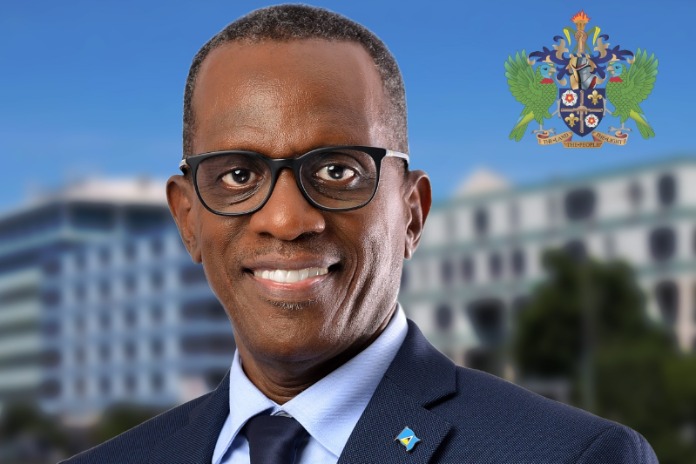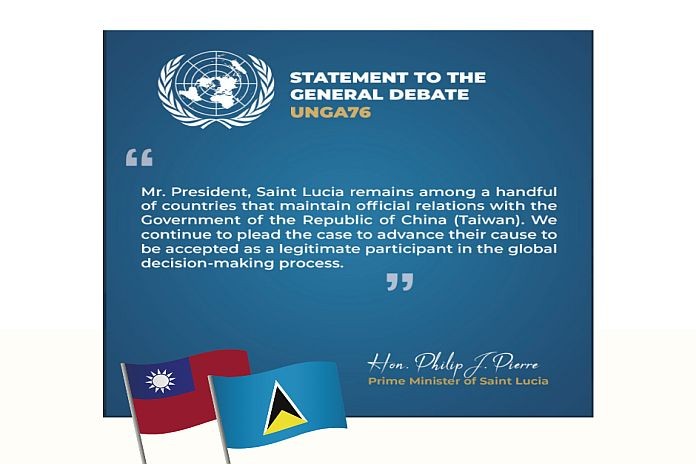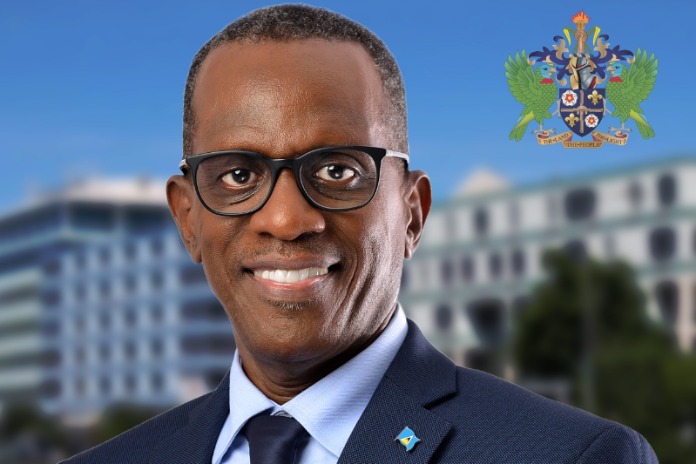Bousquet’s Bulletin: ‘Friends of all, Satellites of none’

Saint Lucia’s new non-aligned foreign policy continues to unfold with every international address delivered by prime minister Philip J. Pierre. The latest indication was the September 25 inaugural address to the United Nations General Assembly (UNGA76), during which prime minister Pierre placed the 42-year-old young nation more in the sphere of alignment with the Non-Aligned Movement (to which it belongs) than with any of the world’s great powers.
By Earl Bousquet
St Lucia’s new non-aligned foreign policy continues to unfold
Address, UNGA76 last weekend, prime minister Philip J. Pierre placed Saint Lucia squarely with developing countries of the South and especially fellow Small Island Developing States (SIDS) that have forever held the bitter end of the stick in the international development beat.
He didn’t declare war on the North, only identifying some historical facts that require a fundamental change in the way the North and South do business today.
But, insofar as ties with Saint Lucia’s Caribbean neighbours are concerned, prime minister Pierre also reiterated earlier positions on Cuba and Venezuela, as well as with Latin American nations, while also promising closer cooperation within regional organizations like CARICOM and the OECS.
Cuba
No Saint Lucian government has shown open hostility to Havana since the two countries established ties in 1980, but the last administration, led by ex-prime minister Allen Chastanet, did drift closest to Washington’s hostile policy under the Donald Trump administration, whether by way of seeming to accommodate the US State Department’s continuing efforts to paint Cuba as being engaged in ‘Human Trafficking’ or otherwise, keeping ties as cool as possible to not bother Washington, whether under presidents Trump or Joe Biden.
But within days of taking office, Pierre showed interest in re-engaging with Havana and Caracas in the traditional closer ways always enjoyed under Saint Lucia Labour Party (SLP) administrations.
“The development of Saint Lucia will continue to be compromised, as long as the development of our sister nation of Cuba continues to be frustrated by global political considerations,” Pierre told UNGA 76. In this regard, he added, “Saint Lucia encourages a revisiting of the chapter in history not too long ago, where and when diplomatic reconciliation had commenced between the United States of America and the Republic of Cuba, under the two Barack Obama-Joe Biden administrations.”
“In fact,” Pierre recalled: “Then vice president Biden was the chief envoy of the United States to Cuba, and it would be a signal achievement if, as president of the Biden-Harris administration, he was to bring his work on Cuba to its logical conclusion, with the normalization of relations.”
According to the new Saint Lucia leader, “Cuba continues to punch above its weight with its humanitarian efforts, playing its part in the global COVID-19 response, despite its disadvantaged position in the international community.”
He also told the UNGA, “Saint Lucia joins CARICOM and the global community in renewing calls to the United States to normalize its relations with Cuba and for the abolition of the existing embargo, which only serves as a hindrance to economic growth in Cuba and an obstacle to realizing full regional economic integration in the Caribbean.” Pierre continued, “Given Cuba’s role in health, education, sports and social development in our region, the normalization of relations with Cuba means the advancement of development in our entire Caribbean region. As we make this annual call (for the normalization of relations with Cuba), Saint Lucia wants it to be known that we are speaking to our own development, in as much as we are speaking about the betterment of the lives of the Cuban people.
“At a time when we are experiencing global turmoil,” he added, it is important for good sense to prevail and for the world to fully embrace the immense expertise and resources which the Cuban people have to offer.” According to Pierre, “It is more than overdue for us to make right this grave injustice to Cuba, that has deliberately cut them off from the global supply chain. The continuation of this embargo in 2021,” the Saint Lucia leader said, “is unconscionable!”
Venezuela
But even before Cuba, Saint Lucia under Pierre had shown clearly it had no intention of continuing the previous administration’s quiet but hostile policy towards Venezuela.
From Hugo Chavez to Nicolas Maduro, Saint Lucia’s ties with Venezuela have always flourished more under Labour administrations led by previous prime minister Dr Kenny D. Anthony.
It was, therefore, no surprise when a strong Venezuelan delegation attended the swearing-in of the new Saint Lucia Cabinet on August 17; and in his first press briefing after taking the oath of office, foreign Affairs minister Alva Baptiste indicated the new administration intended to reaffirm ties with Caracas. Nor were any eyebrows raised when Baptiste also said Saint Lucia would withdraw from the “Lima Group” of Canada-led nations supporting aggressive US actions against Venezuela at the Organization of American States (OAS).
St Lucia recommits to Venezuela, prepares to exit Lima Group
Saint Lucia-Venezuela ties indeed took a low dive during the five years under the previous Chastanet-led administration (2016-2021) especially after joining four other CARICOM leaders to meet president Trump at his Mar-a-Lago resort in Florida, where Venezuela was a key agenda item.
Following that unofficial summit between Trump and the cherry-picked Caribbean leaders, Saint Lucia started squeezing Caracas diplomatically, putting ties in the deep freeze and refusing to arrange for the new Venezuelan ambassador to Saint Lucia to present her credentials to the Governor-General, the nominee eventually returning to Caracas after several months in limbo on the island.
Saint Lucia under Chastanet also applies the US sanctions against Venezuela to the extent that the embassy couldn’t pay its bills, or staff, resulting in eventually forced the closure of both the Venezuela Embassy and the Venezuelan Cooperation Center.
But not anymore. The new Saint Lucia leader put ties between the two countries in a historical context when he told the UNGA 76 stating, “the situation in Venezuela concerns Saint Lucia tremendously.”
“As one of the first nations to establish diplomatic relations with Saint Lucia after Independence in 1979 and as a beneficiary of Venezuelan economic cooperation, Saint Lucia considers Venezuela a loyal and legitimate friend and partner. The virtual economic blockade which has been imposed on the democratically-elected government of Venezuela by a few big and powerful countries is unacceptable in this international system. It is even more outrageous, that prominent members of this international system, who pride themselves on their democratic traditions, have sought to recognize an alternative President who did not even contest elections, and who has no political legitimacy whatsoever.”
“Further, the act of seizing and freezing Venezuelan government gold, cash and assets, while preventing access by the Venezuelan people to basic food, medicines and supplies during this pandemic, could quite conceivably qualify as Modern-Day Piracy, Economic Terrorism and Crimes Against Humanity. Saint Lucia and CARICOM cannot, in good conscience, continue to be part in this unjust attack against the Venezuelan people.”
Latin America
The new government’s ties with its Latin American neighbours were defined a week earlier than the UNGA76 address when prime minister Pierre attended the 6th CELAC Summit in Mexico and joined fellow leaders in agreement to chart a new course that saw greater cooperation between member-states in the fight against COVID-19.
St Lucia commits to true democracy, calls for peaceful equitable opportunity at CELAC VI Summit
The Mexico Summit also marked Saint Lucia’s return-in-full to CELAC, following the lesser emphasis the previous Chastanet-led administration ties with Latin American states outside Washington’s orbit, including with the ALBA-TCP group and those associated with the leadership of the PetroCaribe initiative.
Caribbean
Ties with Caribbean Community (CARICOM) neighbours have also seen more indications of greater engagement, Saint Lucia joining OECS and CARICOM initiatives with more nerves than most regional governments, mainly breathing silent sighs of relief about the new air of confidence emerging from Saint Lucia since July 26, 2021, general elections resulted in the island’s fourth consecutive regime change in 20 years.
From COVID-19, cooperation to the pursuit of Reparations from Europe for Slavery and Native Genocide, to the need for SIDS to do more together while seeking more assistance, Pierre has also been shaping a Caribbean policy that would seem to be more engaging than under his predecessor.
Africa
Prime minister Pierre’s first national address, August 1, 2021, a mere four days after taking the oath of office on July 28, was the first indication Saint Lucia was ready, under his watch, to reconnect with Africa.
He announced it as an inaugural annual Emancipation Day address, during which he also promised that his administration would give Saint Lucians more reason to be proud of their African heritage.
Pierre also attended and addressed the inaugural CARICOM-African Union Summit held virtually on September 7, during which he reaffirmed his administration’s intention to work towards the achievement of the many objectives agreed.

Taiwan
In a situation where the US and China were both watching closely to see what the new administration’s approach would be towards Taiwan, the new Saint Lucian leader indicated the island has opted to let the Status Quo continue.
Referring to current Saint Lucia ties with Taiwan in place since 2007 and across three Saint Lucia Labour Party (SLP) and United Workers Party (UWP) administrations respectively, prime minister Pierre told the UNGA 76: “Saint Lucia remains among a handful of countries which maintain official relations with the government of the Republic of Taiwan,” added, “We continue to plead the case to advance their cause to be accepted as a legitimate participant in the global decision-making process.”
Non-Aligned
Prime minister Pierre has several times borrowed the popular phrase by Barbados’ late and great prime minister Errol Barrow, who stated at Barbados’ independence celebrations in 1966 that the island, under his watch, would be ‘Friends of all and satellites of none.’
It’s a quote also employed by former Grenada’s prime minister Maurice Bishop to explain his new government’s foreign policy objectives after Grenada joined the Non-Aligned movement in 1979.
An independent-minded thinker himself; who never depended on anyone for employment since becoming a politician just after returning home as a graduate in business studies from the Cave Hill campus of the University of the West Indies (The UWI) – Pierre has always identified with progressive causes and championed the poor with his party’s election campaign theme of ‘Putting People First!’
His application of Barrow’s principle on non-alignment in international affairs is coupled with a sense of Universal Brotherhood based on equality among and between people and nations, which he also indicated in his UNGA76 address.
New approaches
Foreign affairs minister Baptiste is no stranger to the successful execution of the international relations objectives of previous Labour administrations – and as a veteran parliamentary representative of ‘The People’s Republic of Laborie’ is also a celebrated master at displaying the pleasantries of linguistic delivery and finesse associated with what he once described as “the lubrication of diplomatic intercourse…’
Baptiste’s sartorial eloquence is near-legendary and in the new post-COVID era, his will also be the unenviable task to rewind and refresh the island’s new foreign policy clock at ministerial and overseas diplomatic levels; as the disparities in global wealth and political will continue to demand new approaches to old problems in new times, and as nations increasingly ensure foreign policy is an extension of domestic policy.
SIDS cooperation, South-South Dialogue, COVID-19, Climate Change, re-engagement with the North requires complete reimaging and reimagination of approaches, including widening visions and doing more with less.
The challenges will be many, but each will also bring opportunities, as always, to adapt and adjust to the new challenges that are simply continue to come as SIDS continue to try their best to swim together to avoid sinking and drowning together.
The Pierre-led administration foreign policy continues rolling out as the island keeps taking its place(s) on the regional and international stage. The new government has opted to act more and talk less, while quietly and carefully changing course, mindful of the hurricane-strong winds-of-change blown into its sails by Saint Lucian voters on July 26., 2021.
Source: caribbeannewsglobal.com



